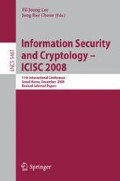Abstract
Oblivious transfer is one of the most important cryptographic primitives, both for theoretical and practical reasons and several protocols were proposed during the years. We propose a protocol which is simultaneously optimal on the following list of parameters: Security: it has universal composition. Trust in setup assumptions: only one of the parties needs to trust the setup (and some setup is needed for UC security). Trust in computational assumptions: only one of the parties needs to trust a computational assumption. Round complexity: it uses only two rounds. Communication complexity: it communicates \(\mathcal{O}(1)\) group elements to transfer one out of two group elements. The Big-O notation hides 32, meaning that the communication is probably not optimal, but is essentially optimal in that the overhead is at least constant. Our construction is based on pairings, and we assume the presence of a key registration authority.
Access this chapter
Tax calculation will be finalised at checkout
Purchases are for personal use only
Preview
Unable to display preview. Download preview PDF.
References
Aiello, W., Ishai, Y., Reingold, O.: Priced oblivious transfer: How to sell digital goods. In: Pfitzmann, B. (ed.) EUROCRYPT 2001. LNCS, vol. 2045, pp. 119–135. Springer, Heidelberg (2001)
Boneh, D., Boyen, X., Shacham, H.: Short Group Signatures. In: Franklin, M. (ed.) CRYPTO 2004. LNCS, vol. 3152, pp. 41–55. Springer, Heidelberg (2004)
Barak, B., Canetti, R., Nielsen, J.B., Pass, R.: Universally composable protocols with relaxed set-up assumptions. In: FOCS, pp. 186–195. IEEE Computer Society, Los Alamitos (2004)
Boneh, D., Franklin, M.K.: Identity-based encryption from the weil pairing. In: Kilian, J. (ed.) CRYPTO 2001. LNCS, vol. 2139, pp. 213–229. Springer, Heidelberg (2001)
Canetti, R.: Universally composable security: A new paradigm for cryptographic protocols. In: FOCS, pp. 136–145 (2001)
Canetti, R., Fischlin, M.: Universally composable commitments. In: Kilian, J. (ed.) CRYPTO 2001. LNCS, vol. 2139, pp. 19–40. Springer, Heidelberg (2001)
Canetti, R., Krawczyk, H.: Universally composable notions of key exchange and secure channels. In: Knudsen, L.R. (ed.) EUROCRYPT 2002. LNCS, vol. 2332, pp. 337–351. Springer, Heidelberg (2002)
Camenisch, J., Neven, G., Shelat, A.: Simulatable adaptive oblivious transfer. In: Naor [Nao07], pp. 573–590
Damgård, I., Nielsen, J.B.: Perfect hiding and perfect binding universally composable commitment schemes with constant expansion factor. In: Yung, M. (ed.) CRYPTO 2002. LNCS, vol. 2442, pp. 581–596. Springer, Heidelberg (2002)
Damgård, I., Nielsen, J.B., Wichs, D.: Isolated proofs of knowledge and isolated zero knowledge. In: Smart, N.P. (ed.) EUROCRYPT 2008. LNCS, vol. 4965, pp. 509–526. Springer, Heidelberg (2008)
Fischlin, M.: Universally composable oblivious transfer in the multi-party setting. In: Pointcheval, D. (ed.) CT-RSA 2006. LNCS, vol. 3860, pp. 332–349. Springer, Heidelberg (2006)
Garay, J.A.: Efficient and universally composable committed oblivious transfer and applications. In: Naor, M. (ed.) TCC 2004. LNCS, vol. 2951, pp. 297–316. Springer, Heidelberg (2004)
Green, M., Hohenberger, S.: Blind identity-based encryption and simulatable oblivious transfer. In: Kurosawa, K. (ed.) ASIACRYPT 2007. LNCS, vol. 4833, pp. 265–282. Springer, Heidelberg (2007)
Green, M., Hohenberger, S.: Universally composable adaptive oblivious transfer (2008)
Goldreich, O., Micali, S., Wigderson, A.: How to play any mental game or a completeness theorem for protocols with honest majority. In: STOC, pp. 218–229. ACM, New York (1987)
Groth, J., Ostrovsky, R., Sahai, A.: Perfect non-interactive zero knowledge for np. In: Vaudenay, S. (ed.) EUROCRYPT 2006. LNCS, vol. 4004, pp. 339–358. Springer, Heidelberg (2006)
Groth, J., Sahai, A.: Efficient non-interactive proof systems for bilinear groups. In: Smart, N.P. (ed.) EUROCRYPT 2008. LNCS, vol. 4965, pp. 415–432. Springer, Heidelberg (2008), http://eprint.iacr.org/2007/155
Joux, A.: A one round protocol for tripartite diffie-hellman. In: Bosma, W. (ed.) ANTS 2000. LNCS, vol. 1838, pp. 385–394. Springer, Heidelberg (2000)
Jarecki, S., Shmatikov, V.: Efficient two-party secure computation on committed inputs. In: Naor [Nao07], pp. 97–114
Kalai, Y.T.: Smooth projective hashing and two-message oblivious transfer. In: Cramer, R. (ed.) EUROCRYPT 2005. LNCS, vol. 3494, pp. 78–95. Springer, Heidelberg (2005)
Lindell, A.Y.: Efficient fully-simulatable oblivious transfer. In: Malkin, T.G. (ed.) CT-RSA 2008. LNCS, vol. 4964, pp. 52–70. Springer, Heidelberg (2008), http://eprint.iacr.org/2008/035
Menezes, A., Okamoto, T., Vanstone, S.A.: Reducing elliptic curve logarithms to logarithms in a finite field. IEEE Transactions on Information Theory 39(5), 1639–1646 (1993)
Naor, M. (ed.): EUROCRYPT 2007. LNCS, vol. 4515. Springer, Heidelberg (2007)
Naor, M., Pinkas, B.: Efficient oblivious transfer protocols. In: SODA, pp. 448–457 (2001)
Naor, M., Pinkas, B.: Computationally secure oblivious transfer. J. Cryptology 18(1), 1–35 (2005)
Peikert, C., Vaikuntanathan, V., Waters, B.: A framework for efficient and composable oblivious transfer. Cryptology ePrint Archive, Report 2007/348 (2007), http://eprint.iacr.org/
Rabin, M.O.: How to exchange secrets by oblivious transfer. Technical Report TR-81, Harvard Aiken Computation Laboratory (1981)
Wiesner, S.: Conjugate coding. SIGACT News 15(1), 78–88 (1983)
Yao, A.C.-C.: How to generate and exchange secrets (extended abstract). In: FOCS, pp. 162–167. IEEE, Los Alamitos (1986)
Author information
Authors and Affiliations
Editor information
Editors and Affiliations
Rights and permissions
Copyright information
© 2009 Springer-Verlag Berlin Heidelberg
About this paper
Cite this paper
Damgård, I., Nielsen, J.B., Orlandi, C. (2009). Essentially Optimal Universally Composable Oblivious Transfer. In: Lee, P.J., Cheon, J.H. (eds) Information Security and Cryptology – ICISC 2008. ICISC 2008. Lecture Notes in Computer Science, vol 5461. Springer, Berlin, Heidelberg. https://doi.org/10.1007/978-3-642-00730-9_20
Download citation
DOI: https://doi.org/10.1007/978-3-642-00730-9_20
Publisher Name: Springer, Berlin, Heidelberg
Print ISBN: 978-3-642-00729-3
Online ISBN: 978-3-642-00730-9
eBook Packages: Computer ScienceComputer Science (R0)

